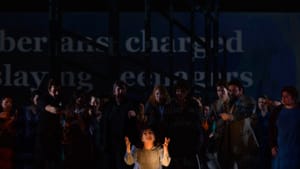Stay in the Loop
BSR publishes on a weekly schedule, with an email newsletter every Wednesday and Thursday morning. There’s no paywall, and subscribing is always free.
The journey, not the end
OperaDelaware presents Jake Heggie and Terrence McNally’s ‘Dead Man Walking’

A powerful production of Dead Man Walking is the centerpiece of OperaDelaware’s 2019 Festival. Sister Helen Prejean’s 1993 bestseller fueled Jake Heggie’s cinematic and compelling score, and it is propelled dramatically by playwright Terrence McNally’s brilliant libretto. Quickly entering the worldwide repertory after its 2000 San Francisco premiere (now with more than 300 performances), this was the composer’s first foray into opera.
A captivating journey
Right from the start the ending is clear, but it’s the journey that captivates. The title phrase—now in the lexicon due to Sister Helen’s book and an award-winning film—encapsulates the final moments of a condemned prisoner. Here, that is Joseph De Rocher (Timothy Mix), accused of two savage murders that are graphically re-enacted onstage.
Sister Helen (Aleks Romano) is a young nun working with children in the projects of her native New Orleans when she begins corresponding with De Rocher, incarcerated in the Louisiana State Penitentiary at Angola. What starts as a pen-pal relationship evolves into something far more potent: De Rocher asks Sister Helen to become his spiritual advisor as he faces death.
Against the counsel of fellow teacher Sister Rose (Adrienne Danrich), Helen makes a hot summer drive to Angola, literally and figuratively embarking on a journey that will embroil her in contacts and conflicts for which she’s unprepared. At the prison, she butts heads with condescending chaplain Father Grenville (Orin Strunk), hostile that a young nun (his inferior in the Catholic Church hierarchy) would challenge him. Prison warden George Benton (Ben Wager) smooths her way through rowdy prisoners and comes face to face with the man who has been called a monster.
Sister Helen enrages the victims’ families as she navigates tenuous emotional territory to establish a relationship with De Rocher. She becomes close to his mother (Jenni Bank), helping her seek reprieves, to no avail. The opera ends with De Rocher’s deathbed confession and chemically induced death.
Tragedy?
But is it a tragedy? The artistic firepower and spiritual inspiration that created this work still power it two decades on, and OperaDelaware packs its production with riveting performances, strong singing, and gripping staging. Conductor Jerome Shannon leads an excellent orchestra in a potent performance that highlights the work’s cinematic and narrative elements without pushing or embellishing this already dramatic score. Heggie’s music and McNally’s libretto are virtually seamless, and the OperaDelaware singers realize them to create vivid musical and dramatic characterizations.
McNally repeatedly writes theatrical sung monologues, and the company’s singers handle this convention expertly. The clearest example is Sister Helen’s first-act aria—seated in a chair using the “driving a car” stage convention—that is informed and shaped by stasis while her mind ranges. Here and throughout, Romano uses her entire mezzo range to beautifully create the arc of Sister Helen’s journey and transformation. It’s a masterful and memorable performance.

As death-row inmate De Rocher, Mix delivers a rangy portrait that highlights not only the inherent melodrama of this troubled criminal but also delves into his uncertainty and vulnerability. Singing Helen’s counselor and friend Sister Rose, Danrich is striking vocally and dramatically polished. And as the condemned man’s mother, Bank—whether seated in front of the pardon board delivering one of McNally’s sung monologues or saying farewell to her son—is heartbreakingly affecting.
Toward clarity
Aurelian Eulert prepared the excellent OperaDelaware chorus, and director Octavio Cardenas’s powerful stagecraft begins at the red velvet theater curtain. As the audience arrives, Tláloc López-Watermann’s beautiful lighting design begins with a single projection: a nest of barbed wire that is also a Christian symbol—the crown of thorns. Soon, above the oscillating strings of the overture, a montage of period newspaper articles appears on the curtain. The sensational headlines are clear, but as the fabric folds ripple, the small print moves and morphs, impossible to decipher.
This musical and visual synthesis is a metaphor for the opera: We see only partially, only dimly, and redemption is a journey toward clarity. On Jefferson Ridenour’s striking and well-conceived set, Cardenas creates both the compression and the movement that are integral to the success of this opera. All the production elements combine to tell a disturbing story that both provokes and inspires, as the music and libretto offer time to process what is happening.
Sister Helen Prejean’s lifelong work to eliminate the death penalty was sparked by her experiences at Angola, and she says that the success her book and the subsequent film have engendered are gratifying. But for her, “the fullness of my experience is really captured in this opera.” As Sister Helen joined the company onstage for the curtain call, a roar went up from the audience: Artists and their inspiration were united on the OperaDelaware stage.
What, When, Where
Dead Man Walking. Music by Jake Heggie; libretto by Terrence McNally; based on the book by Sister Helen Prejean. Directed by Octavio Cardenas; conducted by Jerome Shannon. Through May 4, 2019, at the Grand Opera House, 818 North Market Street, Wilmington, DE. (302) 442-7807 or operade.org.
Contains explicit content. Not recommended for audiences under age 15.
To purchase wheelchair-accessible seating for OperaDelaware performances, or for other accessibility questions, call the box office.
Sign up for our newsletter
All of the week's new articles, all in one place. Sign up for the free weekly BSR newsletters, and don't miss a conversation.

 Gail Obenreder
Gail Obenreder